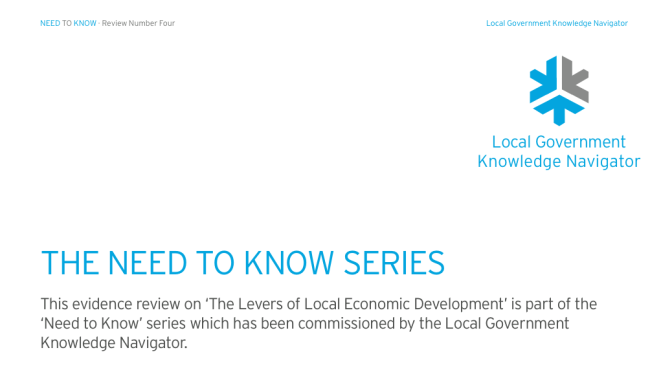In May 2014 I published a report on the levers of local economic development, as part of the Need to Know series commissioned by the Local Government Knowledge Navigator. I also discussed my main findings in an article for the Guardian.
The report explores the existing knowledge base on the levers of local economic development by assessing the findings of international academic research from the past 20 years alongside research and reports from government, think tanks, consultancies and various non-governmental organisations, considering insights from over 100 items of literature in total.
Firstly, the review weighs up the evidence behind broad approaches to local economic development. This first section of the review considers questions such as: is it better to focus on attracting inward investment or on ‘growing your own’? Should areas concentrate on their own performance, or their competitiveness with other areas? Does quality of life affect economic development? This section of the review draws the following broad conclusions:
- Sensitivity to place matters: there are different routes to economic development in different areas.
- Local economic development should be focused on growing and nurturing local capital rather than simply attracting inward movements of existing capital from other locations.
- Competitiveness should not be the guiding narrative behind local economic development strategies.
- Approaches to local economic development need to be holistic.
Secondly, the review considers the evidence base on specific policies to stimulate local economic development. This second section of the review considers the effectiveness of a range of levers, from apprenticeships to urban design; living wages to procurement. This section of the review draws the following conclusions:
- Local skills policy is perhaps the most important lever for local economic development.
- An important but often overlooked set of levers are those relating to community-led development.
- Local authorities are currently limited in their ability to borrow to invest in housing. However, housing-related levers such as stock upgrades can have significant development outcomes.
- Local authorities have a central role in realising the developmental potential of planning across a very broad spectrum, from seeking creative approaches to the problem of hollowed-out town centres to ensuring that physical regeneration delivers meaningful benefits to the broadest possible range of people
- Strong civic leadership is crucial to successful economic development.
- At a time when local authorities’ spending is being significantly curtailed, procurement still has sizeable potential as a lever for local economic development.
The Knowledge Navigator is a two year initiative funded by the Economic and Social Research Council (ESRC), and steered by ESRC, Local Government Association and Society of Local Authority Chief Executives. It was launched in January 2013 with the aim of helping local government to make better use of existing national investment in research and research-derived knowledge and evidence, and to influence future research agendas, programmes and investment.
